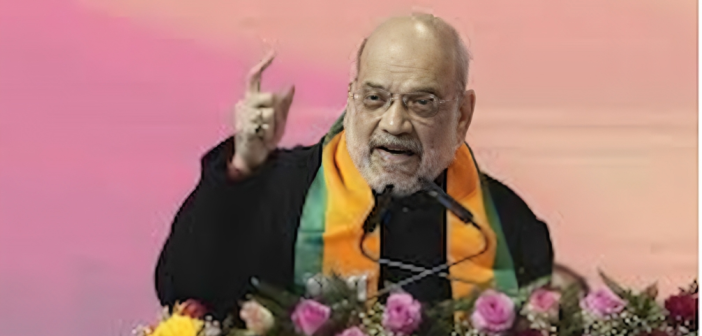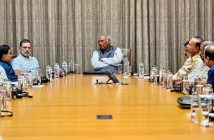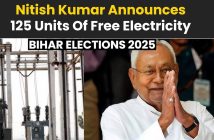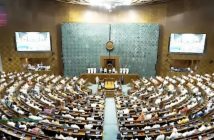Union Home Minister Amit Shah’s key messages in his speech in West Bengal have ignited the 2026 Assembly election campaign, with national security and border control at the forefront. Targeting illegal infiltration from Bangladesh, Shah accused the TMC government of enabling unlawful immigration while promising a BJP-led crackdown if elected. His rhetoric, delivered in border districts, aims to sway voters who are frustrated by the porous borders. As the BJP sharpens its poll narrative, opposition parties cry foul, alleging divisive tactics. Will Shah’s hardline stance reshape Bengal’s political landscape?
Key Details
- Who: Union Home Minister Amit Shah, BJP leaders, TMC, and opposition figures like Mamata Banerjee.
- What: Shah’s speeches focused on illegal infiltration, border security, and the BJP’s 2026 election strategy.
- When: Early 2025, with key events on March 27 and June 1, 2025.
- Where: Kolkata, North 24 Parganas, and the Petrapole land port near the India-Bangladesh border.
- Why: To rally BJP support, criticize TMC governance, and frame national security as a key election issue.
Kolkata’s humid air buzzed with anticipation as Union Home Minister Amit Shah descended on West Bengal in early 2025, setting the stage for the 2026 Assembly elections. Speaking at rallies in border districts like North 24 Parganas, Shah hammered the Trinamool Congress (TMC) for allegedly fostering illegal infiltration from Bangladesh, framing it as a threat to national security. With the Citizenship Amendment Act (CAA) and border management as key planks. He vowed a BJP government would seal the borders and curb corruption. Amit Shah’s key messages, which pointed to attacks on Chief Minister Mamata Banerjee. Stirred both support and controversy, resonating with voters in the border areas but drawing sharp rebukes from the opposition. As Bengal gears up for a heated electoral battle, Shah’s visit signals a polarizing campaign ahead.
Background: Bengal’s Border Challenges
West Bengal shares a 2,216-km porous border with Bangladesh, a hotspot for illegal immigration and smuggling. For decades, the state has grappled with demographic shifts, particularly in border districts like North 24 Parganas and Nadia. These are home to communities such as the Matuas, who migrated from Bangladesh after the Partition. The BJP has long capitalized on these issues, promising to curb infiltration and implement the CAA to grant citizenship to non-Muslim refugees. In contrast, the TMC accuses the BJP of stoking communal tensions for votes. Shah’s 2025 visit, following a lackluster BJP performance in the 2024 Lok Sabha polls (12 seats compared to TMC’s 29), aimed to rekindle voter enthusiasm.
Shah’s Key Messages: National Security and Infiltration
At Petrapole’s new passenger terminal on March 27, 2025, Shah declared, “Peace in Bengal hinges on stopping cross-border infiltration from Bangladesh.” He accused the TMC of “showing mercy to infiltrators” by delaying 450 km of border fencing and enabling fake Aadhaar and voter cards, particularly in 24 Parganas. On June 1 in Kolkata, he escalated his rhetoric: “Mamata Banerjee has opened the nation’s borders for infiltrators.” Shah promised that a BJP government in 2026 would halt illegal immigration, ensuring “not even a bird can sneak across.” He tied border security to national stability, framing the election as a referendum on Bengal’s future and India’s safety.
Citizenship and CAA: A Divisive Promise
Shah reiterated the BJP’s commitment to the CAA, which fast-tracks citizenship for non-Muslim migrants from Bangladesh, Pakistan, and Afghanistan arriving before 2014. “CAA was, is, and will be a reality,” he said, addressing Matua voters who see the law as a path to legal status. However, he distanced the party from the National Register of Citizens (NRC), stating, “No NRC exercise in Bengal now,” a shift from earlier campaigns in which he had referred to infiltrators as “termites.” This softening reflects concerns over alienating voters, as the NRC sparked fears of disenfranchisement among Bengalis with Bangladeshi roots.
Opposition Criticism: TMC and Congress Strike Back
The TMC dismissed Shah’s claims as divisive. Minister Sashi Panja called BJP leaders “seasonal visitors” who exploit border issues for votes but lack genuine commitment. Mamata Banerjee, a vocal CAA opponent, vowed, “As long as I’m alive, I won’t allow CAA or NRC in Bengal.” She accused the BJP of using citizenship as a “ploy to fool the masses.” Congress MP Manish Tewari criticized the Immigration and Foreigners Bill, 2025, which Shah defended in Parliament, warning of potential misuse and civil liberty violations. Opposition leaders argue Shah’s narrative risks communal polarization, alienating Bengal’s significant Muslim population.
BJP’s Poll Narrative and Voter Sentiments
Shah’s speeches are a calculated bid to consolidate the BJP’s base in border districts, where resentment over illegal immigration and economic strain runs high. In areas like Petrapole, voters expressed frustration with unchecked crossings and fake IDs, aligning with Shah’s call for change. “We want jobs, not infiltrators,” said a local shopkeeper in North 24 Parganas. Yet, the BJP’s 2024 electoral setbacks suggest limited traction for its polarizing rhetoric, with TMC’s welfare schemes retaining strong support. Shah’s focus on women’s safety, citing incidents like Sandeshkhali, aims to broaden appeal, but TMC counters that the BJP neglects local issues like unemployment.
Policy Promises and Strategic Implications
Shah pledged that a BJP government would complete border fencing, modernise the Border Security Force (BSF) with advanced technology, and curb corruption. “TMC leaders usurp funds sent by PM Modi for Bengal’s development,” he claimed, promising “Sonar Bangla” (Golden Bengal) under BJP rule. Strategically, his visit signals “Operation Bengal,” a grassroots campaign aimed at unseating the TMC in 2026. Nationally, the BJP seeks to project itself as the sole guardian of security, leveraging Bengal’s border issues to bolster its image ahead of other state elections. However, alienating Muslim voters risks long-term electoral costs.
Public and Political Reactions
Supporters at Shah’s rallies cheered his tough stance, with many in border areas chanting for stricter controls. “We need a government that protects us,” said a Petrapole resident. Conversely, TMC rallies in Kolkata saw thousands protest the CAA and NRC, reflecting a deep distrust of the BJP’s motives. On X, posts echoed Shah’s accusations of TMC’s “appeasement” but also highlighted opposition claims of BJP’s “communal agenda.” The polarized reactions underscore Bengal’s fractured political landscape, where security and identity remain flashpoints for contention.
Conclusion
Amit Shah’s 2025 visit to Bengal has sharpened the BJP’s election strategy, framing illegal infiltration and national security as key issues for the 2026 elections. His promises of border control and CAA implementation resonate with some voters but risk deepening communal divides. The TMC’s fierce opposition and Bengal’s complex demographics suggest a tight electoral contest. As both parties vie for border districts, the outcome will test whether Shah’s hardline rhetoric can overcome TMC’s entrenched influence, shaping not just Bengal’s future but India’s broader political narrative.
Explore how Shah’s border security push shapes Bengal’s 2026 elections.




